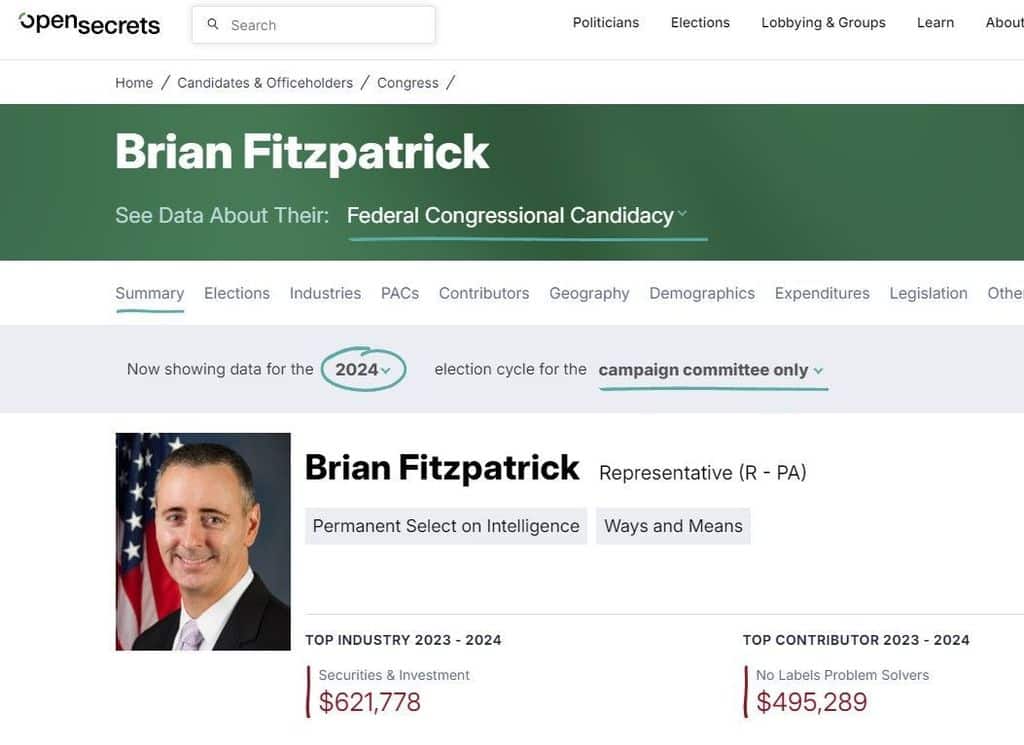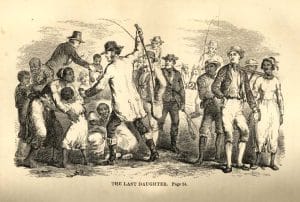It all makes sense now. It makes sense that Congressman Brian Fitzpatrick shuns interviews with local media, skips out of candidate forums, spurns debates, and has refused to host free and public town halls for the past 7 years.
Why does it make sense? Just follow the money.
Only 1 percent of Fitzpatrick’s money comes from small donors while a whopping 92.5 percent comes from out of state. He doesn’t answer to voters in his district. He answers to out-of-state big pockets and PACs.
But before we dig into the groups that give Fitzpatrick the bulk of his campaign cash, let’s look at the demographics of Fitzpatrick’s donors this election cycle as a group. This information is all sourced from Open Secrets, a non-profit that takes publicly available data from the Federal Elections Commission and repackages it in a more easily digestible format, and provides analysis like this demographic breakdown.

What jumped out from this Open Secrets page was the fact that so little of Fitzpatrick’s money comes from the people he represents.
Under 7.5 percent of Fitzpatrick’s donations come from Pennsylvania’s First Congressional District. So the people funding him, for the most part, are not his own constituents. Maybe that explains why he has no interest in interacting with the folks in Bucks and Montgomery counties.

This information about how little of Fitzpatrick’s money is coming from within the district is even more damning when one considers the top zip codes from which his individual giving is sourced. A certain wealthy gym owner that is closely allied with Fitzpatrick and is a known megadonor to GOP candidates lives within that top-listed zip code. It is entirely possible that a large chunk of Fitzpatrick’s in-district funding is coming from that one donor.

The next big disparity one notices in the demographic information is the vast gulf between the money donated by women versus the money donated by men. Well over 75 percent of Fitzpatrick’s funding is coming from men. This is not particularly surprising when one takes into consideration his vote for a national abortion ban, and his other 11 votes against women’s bodily autonomy. But the disparity between genders is stark … and telling.

Open Secrets also breaks down the donations by the type of donor, showing if money is coming from political action committees (PACs), donors who are giving lots of money, or donors who are providing smaller (under $200) donations. This chart shows that only 1 percent of Fitzpatrick’s money is coming from small donors. The vast majority of this is coming from PACs and very rich people who give large donations. Congressman Fitzpatrick also gets 21 percent of his money from “Other” sources – and despite trying for years to get to the bottom of what that means, that designation remains a black box of mystery.
Next we will turn to the Federal Election Commission, who offer downloads of any candidate’s fundraising information. You can download and peruse all of Fitzpatrick’s 2023-24 cycle donors from the FEC here by hitting the “export” button on the top right of the page. We are going to concentrate on the parties that make up the bulk of Fitzpatrick’s incoming funds.

Fitzpatrick’s number one donor, by far, is the NO Labels PAC, who donated well over three quarters of a million dollars. This is the group behind the formation of the Problem Solvers Caucus, which Fitzpatrick has co-chaired for nearly his whole time in office. If you are interested in more history on the organizational connections between No Labels and the problem Solvers Caucus, please see the Bucks County Beacon article “Rep. Brian Fitzpatrick’s Problem Solvers Caucus Hasn’t Actually Solved Anything.”

But there is one piece of the Fitzpatrick-No Labels relationship that bears repeating. Back in 2021, The Intercept published details of a call held between Senator Joe Manchin, billionaire No Labels donors, and the group’s leaders. During that call, No Labels founder and CEO Nancy Jacobsen used the group’s funding of Fitzpatrick as a bragging point for how quickly they could funnel cash to lawmakers. She said, “As far as the members of Congress, I mean, we did over 500,000 for Brian Fitzpatrick, which took us two weeks to put that together.” Fitzpatrick is the poster boy for No Labels influence on Congress.
It is a bit harder to determine exactly who funds No Labels. But earlier this year Mother Jones published a bombshell article that gave information on 36 “wealthy contributors.” Among the donors they revealed are:
– “Harlan Crow, the billionaire benefactor of Supreme Court Justice Clarence Thomas and a collector of Nazi memorabilia”
– “Michael Smith, the billionaire founder of natural gas behemoth Freeport LNG”
– “Tom McInerney, a private-equity investor, who has regularly donated to the Republican National Committee and GOP-linked super-PACs”
– “Allan Keen, a successful Florida real estate developer”
What is important to remember is that there are very few limits on the amount of money that donors can give to dark money groups like No Labels, whereas individuals who give directly to candidates have a maximum of $3,300 per cycle and per election (so they can give double, to account for the primary and general election). So while some of those rich No Labels donors can and do show up as individual donors for Brian Fitzpatrick, they can give many times as much money to him indirectly via a middleman group like No Labels.
The second line item on the FEC report is “WINRED.” That is the Republican equivalent of ActBlue, the small-donor funding collection point that many people prefer to use to give recurring donations to candidates. So the WINRED data represents a variety of small donors for which we do not have individual information. In some cases, people may not even have intentionally donated to Fitzpatrick, but instead given funds to “frontline candidates across the nation” or some other fundraising designation that split money between a number of candidates.

Our next FEC entry for nearly $344,000 is from Protect the House 2024. That is a political action committee started by Kevin McCarthy, back when he was still the Republican Speaker of the House. McCarthy may be out of power now, but he still has his PAC to play with. And he has been busy rewarding lawmakers who were loyal to him – like Brian Fitzpatrick – and funding primary competitors for the eight GOP lawmakers who were the deciding votes to kick him out of power last year. So while Fitzpatrick is making false claims of being a moderate, he’s getting a huge chunk of campaign cash from the man who was integral to the revival of Donald Trump’s political career after january 6th.
But Kevin McCarthy isn’t the only Republican leader who is funding Fitzpatrick. Two of the other line items on that list of top donors from the FEC report are members of the current GOP House leadership team. Grow the Majority, responsible for funneling over $35,000 is the PAC controlled by House Speaker Mike Johnson. And the line item for Emmer Majority Builders for over $61,000 is tied to the Republican Majority Whip, or number 2 in the GOP House.
That $100,000+ from the pair of GOP bigwigs is not the extent of the money that Fitzpatrick will have earned from his close relationship to the leaders of his party. Back on October 10, a rich family in Newtown hosted Fitzpatrick, alongside Speaker Johnson and Majority Whip Emmer. Because that event was scheduled after the FEC’s September 30 reporting deadline for the third quarter, whatever was raised at that event is not captured in the fundraising reports that are available to the public.

Not to belabor the obvious, but GOP leadership doesn’t promote, donate to, or fundraise for candidates who don’t have the party’s back. The presence of the numbers one and two in the GOP House here in Bucks County give lie to Fitzpatrick’s claims of independence, bipartisanship and moderation. They would not have come here on his behalf if they weren’t sure he was a loyal soldier who would do as he is told.
The final presence on the FEC report with a massive presence is the American Israel Public Affairs Committee, and they have provided Brian Fitzpatrick with almost a quarter of a million dollars. AIPAC is a right-leaning lobbyist group that represents the interests of Israel in Washington DC and has been donating to lawmakers for over 60 years. If you are interested in learning the latest about AIPAC’s operations, please see this week’s article in The Intercept, “How Does AIPAC Shape Washington? We Tracked Every Dollar.” Fitzpatrick has always been a reliable pro-Netanyahu vote, and AIPAC rewards him for that with this hefty pile of campaign cash.
As you piece together information about who to vote for in the coming Congressional election here in Pennsylvania’s First District, let these Open Secrets and FEC reports help you make up your mind. We’ve learned that over 92 percent of Brian Fitzpatrick’s campaign cash comes from people he does not represent. Instead, he is being funded by a mix of No Labels billionaires and the leaders of his own political party. That tells us a lot about whose input he values and who is granted access. And Fitzpatrick is demonstrating that fact by failing to make any attempt to talk to his own constituents in this campaign season.
We’re not funding him … so he’s not talking to us.






